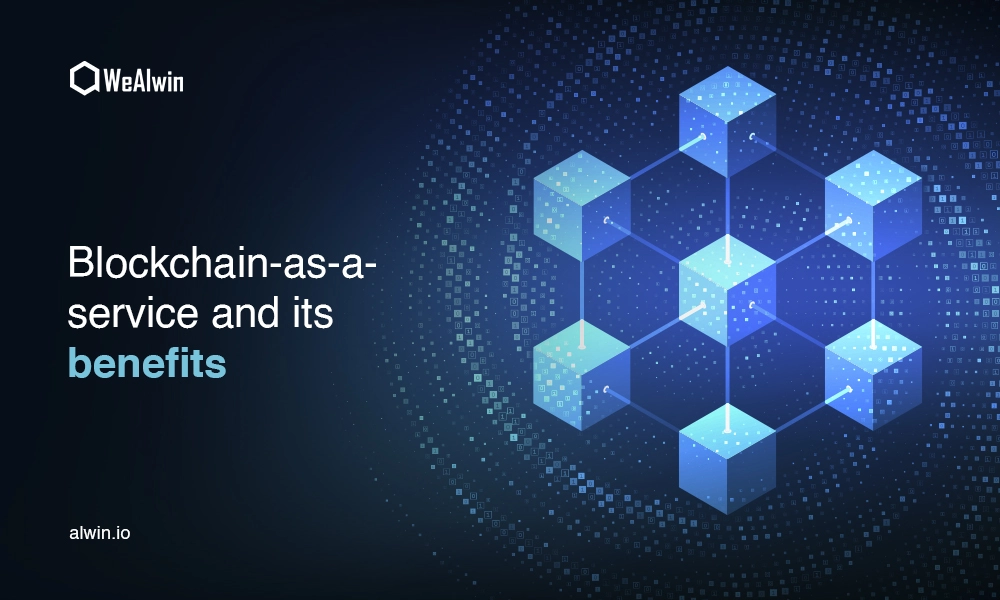Blockchain technology is rapidly reshaping how we think about data sharing, security, and transactions in the digital age. But, as intriguing as blockchain is, its complexity and the resources needed for its implementation can be daunting for many organizations.
Enter Blockchain-as-a-Service (BaaS), a game-changer that promises to make this revolutionary technology accessible to businesses of all sizes. BaaS providers manage the back-end for blockchain applications, offering a cost-effective, scalable, and less technical pathway to embracing blockchain's potential.
Let's dive into the advantages and use cases of BaaS in today's digital landscape, making the future of blockchain not just fascinating but practically within reach.
What is Blockchain-as-a-Service (BaaS)?
Blockchain-as-a-Service (BaaS) can be compared to a sort of middleman between blockchain technology and the wide array of businesses eager to incorporate it but without the technical know-how or resources.
Much like Software-as-a-Service (SaaS), BaaS is a cloud-based service that enables users to build and host their blockchain apps, smart contracts, and functions using the cloud service provider's blockchain infrastructure. This turns the complex blockchain technology into a more accessible and user-friendly tool for businesses.
Key Components of BaaS
The heart of BaaS lies in its components, which typically include blockchain protocol management, infrastructure maintenance, node operations, and security measures. Providers of BaaS offer a comprehensive suite of tools for developers, including functionalities for designing, deploying, and managing blockchain applications. They handle the backend operations of blockchain systems, leaving businesses to focus on their core activities without worrying about the complexities of blockchain technology management.
Benefits of Blockchain-as-a-Service (BaaS)
The benefits of BaaS extend beyond mere technological sophistication.
By outsourcing the technical intricacies to a service provider, businesses can swiftly integrate blockchain into their operations for enhanced transparency, efficiency, and security.
BaaS offers a low-entry barrier to blockchain adoption.
fosters innovation through pre-designed frameworks and templates and ensures that the blockchain infrastructure scales with the growing needs of the business.
Advantages of Blockchain-as-a-Service
Cost-Effectiveness
Traditionally, developing a blockchain solution from scratch would require significant investment in hardware, software, and expertise. BaaS, however, dramatically reduces these expenses by providing an all-in-one solution that covers development, deployment, and maintenance, all for a predictable subscription fee.
Scalability
BaaS offers unparalleled scalability options. As businesses grow and their needs evolve, the blockchain infrastructure can easily scale to accommodate increased demands without the need for substantial capital outlays or redevelopment efforts. This agility ensures that businesses can remain competitive and adaptable in a fast-paced digital environment.
Security
Security is a cornerstone of blockchain technology, and BaaS leverages this to provide robust protection for business data. BaaS providers implement advanced security protocols, including encryption, network monitoring, and redundancy measures, to safeguard against unauthorized access and potential vulnerabilities. This high level of security instills confidence in businesses to engage in blockchain-based transactions and operations.
Simplified Implementation
Perhaps the most attractive advantage of BaaS is the simplified implementation it offers. Businesses can bypass the steep learning curve associated with blockchain technology and deploy blockchain solutions with minimal effort. BaaS platforms provide user-friendly interfaces, comprehensive support, and customizable options that make blockchain accessible to businesses of all sizes and sectors, opening up a world of possibilities for innovation and competitive differentiation.
Use Cases of Blockchain-as-a-Service
Supply Chain Management
Blockchain-as-a-Service (BaaS) is revolutionizing supply chain management by providing a transparent and unchangeable ledger for tracking products from their origin to the consumer. With BaaS, companies can easily identify inefficiencies within their supply chains and authenticate the authenticity of their products, drastically reducing the chances of counterfeit goods and ensuring compliance with regulations. This leads to improved operational efficiencies and enhanced customer trust.
Identity Verification
In our increasingly digital world, identity theft is a significant concern. BaaS offers a robust solution by enabling secure and efficient identity verification processes. Using blockchain technology, identities can be verified against immutable records, significantly reducing the risk of fraud. This application is particularly useful in banking, online services, and any domain where customer trust is paramount.
Smart Contracts
BaaS platforms enable businesses to implement smart contracts that automatically enforce, execute, or document legally relevant events according to the terms of a contract. This reduces the need for intermediaries, thereby saving time and costs and removing the potential for disputes.
Healthcare Data Management
In healthcare, BaaS can be used to create secure, immutable records of patients’ medical histories. This allows for secure sharing of data between authorized parties, improving the efficiency and accuracy of diagnosis and treatment, and ultimately enhancing patient care. Furthermore, blockchain technology can ensure the integrity and confidentiality of sensitive medical information, addressing privacy concerns.
Data Storage
Blockchain offers decentralized data storage solutions that are more secure and less susceptible to attacks than traditional centralized data storage systems. With BaaS, businesses can leverage blockchain technology for storing data, benefiting from enhanced security, as well as better control and management of their data.
FinTech
The FinTech industry is rapidly adopting BaaS to streamline operations and introduce groundbreaking financial products. From enabling seamless, secure payments across borders to offering innovative lending solutions, blockchain technology is at the forefront of transforming the financial services landscape.
Healthcare
Beyond data management, healthcare systems are using BaaS for drug traceability, consent management, and even combating counterfeit drugs. The immutable nature of blockchain ensures that once a record is made, it cannot be altered, offering a new level of transparency and security in the healthcare sector.
Document Tracking
From legal agreements to academic certificates, document verification and tracking are a breeze with BaaS. It offers a secure and efficient way to authenticate and manage documents throughout their lifecycle, significantly reducing fraud and ensuring the integrity of important documents.
The Top Blockchain-as-a-Service Providers
While the market is bustling with innovative companies, a few top players stand out in the BaaS landscape.
IBM Blockchain is renowned for its robust platform that caters to industries such as supply chain, healthcare, and finance.
Microsoft Azure Blockchain Services is another powerhouse, offering tools that streamline the development and management of blockchain applications.
Amazon Web Services (AWS) complements its vast cloud infrastructure with BaaS capabilities, enabling businesses of all sizes to deploy blockchain solutions efficiently.
These providers are at the forefront of making blockchain technology accessible, allowing businesses to innovate and transform their operations with the cutting-edge advantages of blockchain.
How Does Blockchain-as-a-Service Work?
Imagine you're hosting a big party, but instead of preparing everything yourself, you hire a service to handle it all—from the catering and decorations to the cleanup afterward. That's essentially what Blockchain-as-a-Service (BaaS) does but for blockchain technology. BaaS providers help businesses build, host, and operate their own blockchain apps and functions on the blockchain, all without the need to invest in costly infrastructure or specialized blockchain expertise.
The BaaS model operates by hosting blockchain technology on behalf of its customers. These providers offer the necessary support for maintaining and operating a blockchain infrastructure, including keeping the network secure, active, and up-to-date. Customers can usually access their services via the cloud, making it a scalable and flexible solution that can grow with their needs. Essentially, it's like renting a piece of the blockchain to use for your projects without needing to own the entire system.
Industry-wise use cases of Blockchain-as-a-service
The versatility of BaaS is proven by its adaptability across various industries. Let's delve into a few sectors where BaaS is making significant impacts:
Finance and Banking
In the finance and banking industries, security and transparency are paramount. Here, BaaS can revolutionize how transactions are processed and how records are kept. By employing blockchain technology, banks can offer more secure, efficient, and cost-effective services, such as:
- Cross-border payments with lower fees and faster processing times.
- Fraud reduction through secure and immutable transaction ledgers.
- Streamlined KYC (Know Your Customer) processes through a shared and reliable customer identity management system.
Supply Chain Management
The supply chain sector greatly benefits from the transparency and traceability that BaaS offers. By integrating blockchain into their processes, companies can achieve:
- Enhanced product traceability to verify the authenticity of goods and combat counterfeiting.
- Improved efficiency by eliminating intermediaries and reducing manual paperwork.
- Better transparency and trust among suppliers, shippers, and customers.
Healthcare
In healthcare, managing patient records securely and efficiently is a major challenge. BaaS can introduce revolutionary changes, such as:
- Secure sharing of patient records among healthcare providers, ensuring data integrity and privacy.
- Enhanced drug traceability to ensure that medications are authentic and safe.
- Improved data security for sensitive patient information, reducing the risk of data breaches and fraud.
Blockchain-as-a-Service is transforming industries by offering accessible, efficient, and secure blockchain solutions. From finance and supply chain management to healthcare, BaaS is paving the way for innovative applications that can tackle long-standing challenges. As this technology continues to evolve, we can expect to see even more creative and impactful uses across various sectors, making BaaS an integral part of our digital future.
How Blockchain-as-a-Service Impact Businesses?
Blockchain-as-a-Service (BaaS) is revolutionizing how businesses operate, offering a scalable and cost-effective solution for integrating blockchain technology. With BaaS, companies of all sizes can now access a secure and decentralized network without the hefty investment in infrastructure and specialized personnel.
Enhanced Security: By leveraging BaaS, businesses benefit from the inherent security features of blockchain, including tamper-resistant records and secure transactions.
Improved Efficiency: Streamlining operations becomes more achievable with BaaS. It reduces the complexity and time required for blockchain application development, allowing for quicker deployment and integration into existing systems.
Cost Reduction: Adopting blockchain technology through BaaS models helps businesses cut down on upfront costs related to hardware, software, and staffing, translating to significant savings.
In the final analysis, BaaS is not just a trend but a pivotal advancement, enabling businesses to harness the power of blockchain technology efficiently and cost-effectively, thus driving innovation and competitiveness in the digital era.



